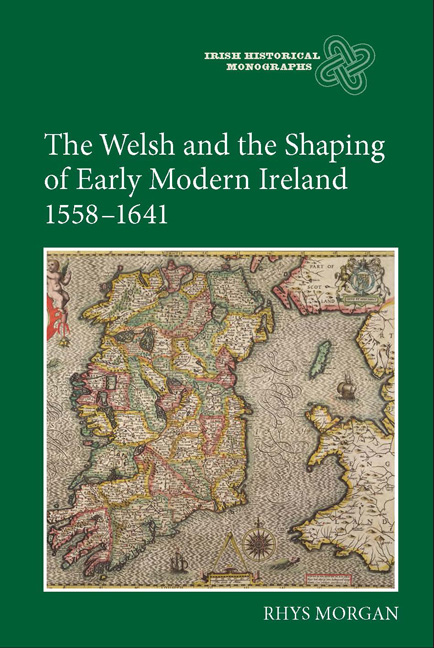Book contents
- Frontmatter
- Dedication
- Contents
- List of illustrations
- Acknowledgements
- Abbreviations
- Introduction: Locating the Welsh in Ireland and Britain during the early modern period
- Part I From soldier to settler
- Part II The New Welsh
- Conclusion
- Appendices
- Appendix 1 Identifying the Welsh: the reliability of surnames as evidence
- Appendix 2 English and Welsh levies for Ireland, 1558–1640
- Appendix 3 Welsh captains in Ireland, 1558–1640
- Appendix 4 The administrative positions of Welsh officers and their families after 1588
- Bibliography
- Index
Appendix 1 - Identifying the Welsh: the reliability of surnames as evidence
from Appendices
Published online by Cambridge University Press: 05 November 2014
- Frontmatter
- Dedication
- Contents
- List of illustrations
- Acknowledgements
- Abbreviations
- Introduction: Locating the Welsh in Ireland and Britain during the early modern period
- Part I From soldier to settler
- Part II The New Welsh
- Conclusion
- Appendices
- Appendix 1 Identifying the Welsh: the reliability of surnames as evidence
- Appendix 2 English and Welsh levies for Ireland, 1558–1640
- Appendix 3 Welsh captains in Ireland, 1558–1640
- Appendix 4 The administrative positions of Welsh officers and their families after 1588
- Bibliography
- Index
Summary
Any study that attempts to identify the geographical origins of soldiers and settlers in Ireland will inevitably come to rely, at least in part, on the evidence of surnames. Lists of names found on muster rolls or estate rentals are, in most cases, the only evidence for the majority of men and women who travelled to Ireland during the early modern period. These names form an indispensable but potentially misleading resource for historians seeking to determine the composition of the ‘New English’. To determine the extent of the Welsh presence in early modern Ireland it is necessary to use names as a signifier of ethnicity. This must be done, however, with an awareness that the method is far from infallible. Welsh men and women with ‘English’ surnames will be missed, while some English and Scottish soldiers or settlers will be included because of their apparently ‘Welsh’ surnames. Wherever possible in this book, additional evidence has been used to ascertain the origins of ‘British’ individuals in Ireland. Despite these problems, sensitive and careful use of surnames can still be employed as a valid and revealing methodology.
The major precedents for using the evidence of surnames in the Irish historiography are the studies of Scottish settlers in seventeenth-century Ulster by Michael Perceval-Maxwell and Philip Robinson. Both have used Scottish surnames to quantify the Scottish presence in Ulster and suggest which regions of Scotland were the major source of settlers.
- Type
- Chapter
- Information
- The Welsh and the Shaping of Early Modern Ireland, 1558–1641 , pp. 163 - 168Publisher: Boydell & BrewerPrint publication year: 2014



